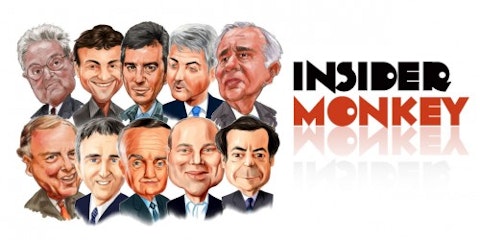Through extensive research, we determined that imitating some of the picks of hedge funds and other institutional investors can help generate market-beating returns over the long run. The key is to focus on the small-cap picks of these investors, since they are usually less followed by the broader market and are less price-efficient. Our backtests that covered the period between 1999 and 2012, showed that following the 15 most popular small-caps among hedge funds can help a retail investor beat the market by an average of 95 basis points per month (see more details here). Since we follow several hundred hedge funds and other smart money investors, we like to stay on top of things and keep you updated regarding the latest developments that take place in the smart money universe.
Jeffrey Ubben’s Activist Firm Settles Allegations Over Investments in Halliburton and Baker Hughes
San Francisco-based activist firm ValueAct Capital Management, run by Jeffrey Ubben, agreed to settle allegations over investments made in oilfield services companies Halliburton Company (NYSE:HAL) and Baker Hughes Incorporated (NYSE:BHI) after the two companies announced their merger in November 2014, announced the U.S. Department of Justice last week. Precisely, the U.S. Justice Department accused the activist hedge fund firm of failing to properly disclose the purchase of more than $2.5 billion worth of voting shares of the two companies with the intent to help the multi-billion-dollar Halliburton-Baker Hughes merger close. In April, the DoJ filed a lawsuit against funds run by ValueAct Capital, claiming that the activist fund held discussions with the management of both companies amid ongoing antitrust review of the companies’ proposed merger, in violation of the Hart-Scott-Rodino Act. The law exempts investors buying up to 10% of a company’s voting securities from disclosing purchases made only for passive investment purposes. The San Francisco-based activist asset manager agreed to pay a record $11 million to settle allegations, as the highest fine paid for an HSR violation was $5.67 million. In early May, oilfield services provider Halliburton Company (NYSE:HAL) and its smaller rival Baker Hughes Incorporated (NYSE:BHI) announced the termination of their $28 billion-merger deal after facing opposition from U.S. and European antitrust regulators.

Private Equity Firm Ends Paul Singer’s Orchestrated Polycom-Mitel Deal
Earlier this month, U.S. video-conferencing equipment maker Polycom Inc. (NASDAQ:PLCM) agreed to be bought by private equity firm Siris Capital Group for roughly $1.7 billion, scrapping a deal with Canadian telecoms provider Mitel Networks Corp (NASDAQ:MITL) orchestrated by billionaire activist investor Paul Singer. In early October of 2015, Mr. Singer’s Elliott Management disclosed a 6.6% stake in Polycom and a 9.6% stake in Mitel, urging the two companies to explore a combination that was believed to generate significant equity value for shareholders. In April, Mitel Networks announced that it had agreed to acquire Polycom in a cash-and-stock deal valued at $1.96 billion on the day for the announcement. Under the terms of the freshly-terminated deal, Polycom shareholders were set to receive $3.12 in cash and 1.32 Mitel common shares for each Polycom share. The aforementioned private equity firm offered $12.50 a share in cash for the video-conferencing equipment maker. Elliott Management appeared to be satisfied with the new deal, with one of its officials saying that “This is a great outcome for all parties involved”.
Let’s head to the second page of this article, where we will discuss two other major stories in the hedge fund industry.



